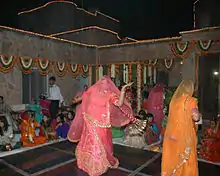Ghoomar
Ghoomar or ghumar is a traditional folk dance of Rajasthan. It was the Bhil tribe who performed it to worship Goddess Saraswati which was later embraced by other Rajasthani communities.[1][2][3][4][5] The dance is chiefly performed by veiled women who wear flowing dresses called ghaghara.[6] The dance typically involves performers pirouetting while moving in and out of a wide circle. The word ghoomna describes the twirling movement of the dancers and is the basis of the word ghoomar.[7][8]
 Female ghoomar dancers | |
| Native name | घूमर |
|---|---|
| Genre | Folk dance |
| Instrument(s) | Dhol, Sahnai |
| Origin | Rajasthan, India |
According to the traditional rituals, newly married bride is expected to dance ghoomar on being welcomed to her new marital home.[9] Ghoomar is often performed on special occasions, such as at weddings, festivals and religious occasions.[10] which sometimes lasts for hours.
'Gangaur Ghoomar Dance Academy' was established by Maharani Rajmata Goverdhan Kumari of Santrampur in 1986, to preserve and promote ghoomar folk dance.[11][12] The Government of India awarded her the fourth highest civilian honour of the Padma Shri, in 2007, for her contributions to arts.[13]
Ghoomar is of Bhil tribe performed to worship goddess Sarasvati which was later embraced by other Rajasthani communities.[1][2][3][4][5] Bheels were a strong community at that time and were in constant war with Rajput kings. After much fighting peace was made and they began interacting with each other. Ghoomar was performed at Rajputana by local women, later on Rajput elite women also started participating in the dance. Men were not allowed at these dance performances. Ghoomar became popular in the Indian state of Rajasthan during the reigns of Rajput kings, and is typically performed by women during auspicious occasions.[1] Women perform ghoomar with ghoonghat on their head covering their face. The dance form acquires different style and slight change in attire with the different regions of Rajasthan. Ghoomar is performed with faster beats in areas adjoining Gujarat, steps similar to garba style, while slower beats in Dhaulpur Karauli Braj kshetra, similarly difference in attire and dancing style can be seen in Udaipur, Kota, Bundi etc.[14]
As a traditional dance, ghoomar often includes traditional songs such as "Gorband", "Podina", "Rumal" and "Mor Bole Re". Songs might be centered on royal legends or their traditions.
- "Chirmi Mhari Chirmali"
- "Aave Hichki" - Traditional Rajasthani Ghoomar song
- "Mhari Ghoomar Chye Nakhrali"
- "Jawai Ji Pawna" - Rajasthani folk song
- "Taara Ri Chundadi"
- "Mharo Gorband Nakhralo"
- "Naina Ra Lobhi"
- "Aur Rang De "
- "Ghoomar"
- "Surat Aap Ri Bannsa"
Gallery
 Women performing ghoomar at wedding
Women performing ghoomar at wedding A Rajput woman performing ghoomar
A Rajput woman performing ghoomar Women performing ghoomar
Women performing ghoomar
See also
References
- "Ghoomar or Ghumar was basically developed by the Bhil tribe and was adopted by other Rajasthani communities".
- Upadhyay, Lipi (26 October 2017). "You've been going crazy over Deepika Padukone's Ghoomar. Do you even know what a ghoomar is?". India Today. Retrieved 17 May 2022.
- "Ghoomar, a traditional Bhil tribe folk dance".
- Kumar, Ashok Kiran (2014). Inquisitive Social Sciences. India: S. Chand Publishing. p. 93. ISBN 9789352831098.
- Danver, Steven L. (28 June 2014). Native People of The World. United States: Routledge. p. 522. ISBN 978-0765682949.
- http://www.rajasthantour4u.com/blog/index.php/2009/06/28/ghoomar-famous-social-folk-dance-of-rajasthan/ Ghoomar - Famous Social Folk Dance of Rajasthan
- "Ghoomar Dance, Rajasthan". Archived from the original on 18 May 2012.
- "Ghoomar Dance - Rajasthan". rajasthanvisit.com. Archived from the original on 29 March 2019.
{{cite web}}: CS1 maint: unfit URL (link) - Indian States At A Glance 2008-09: Performance, Facts And Figures - Rajasthan - Bhandari Laveesh (2008-09)
- "Ghoomar in India". Retrieved 2 December 2016.
- "Image Details". India Today. 6 June 2007. Retrieved 25 August 2016.
- "Rajmata Goverdhan Kumari". Indian Institute of Management, Ahmedabad. 2016. Archived from the original on 17 November 2015. Retrieved 25 August 2016.
- "Padma Awards" (PDF). Ministry of Home Affairs, Government of India. 2013. Retrieved 20 August 2016.
- "ZEE5". comingsoon.zee5.com. Retrieved 14 May 2021.
External links
- An example of Ghoomar - Veena Music YouTube Channel